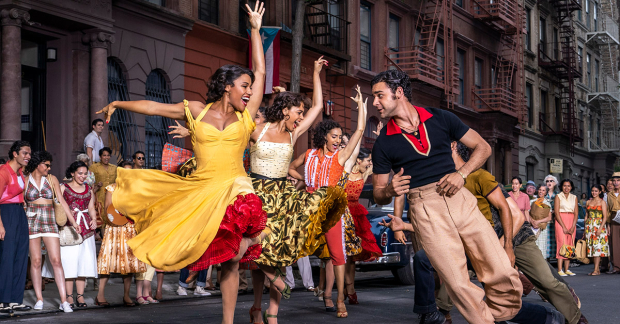West Side Story review – a remake that soars beyond expectations with something to say
The film really gets it right

© 2020 Twentieth Century Fox Film Corporation. Photo by Niko Tavernise All Rights Reserved –
If Netflix's tick, tick…Boom! (November's instalment in what has felt like a rampant year of big-screen versions of stage shows) is a movie created by a musical expert, then West Side Story is a musical crafted by a movie expert.
A lot of that is due to the pedigree of the subject matter: more people will have likely seen Robert Wise and Jerome Robbins' multi-Oscar-winning 1961 cinematic masterpiece, remade here, rather than the 1957 stage show it's based on. So unlike Lin-Manuel Miranda's version of Jonathan Larson's three-hander, cinema already has some skin in the game here.
That's not to say there aren't theatre pros roped into the creative team – the new book is courtesy of Angels in America's Tony Kushner, Justin Peck has the unenviable job of sprucing up Robbins' choreography, Hamilton's Paul Tazewell is on costumes while Fun Home's Jeanine Tesori aids vocals. It's hard not to be moved when the venerated late, great Stephen Sondheim's name appeared during the end credits.
But this is a film firmly in the screen domain – thanks in part because it has Steven Spielberg, who has helped define modern cinema, in the driving seat. It feels wrong to use the deeply clichéd term "visually ravishing", but from the very first gargantuan sweeping shot over a West Side of rubble and dust, that's what Spielberg, along with director of photography and long-time collaborator Janusz Kaminski (Saving Private Ryan) and production designer Adam Stockhausen, have hit with aplomb.
There's a kinetic reverence here and the team make the savvy move to shoot everything the old-fashioned way – despite a giddy, skittish camera, frames sit snugly on a rich, slightly overblown 35mm film (compared, for example, to the silkier Redcode digital of In the Heights) with minimal CGI. Spielberg leans heavily into the lens flare (you can almost imagine the gaffer being given an absurdly chunky budget and told to go full JJ Abrams) but it gives the piece an ethereal, otherworldly glow – aided by the team's decision to shoot with wide, slightly distorting lenses. Gary Rydstrom's sound design also makes the piece sound as though it's lifted right from the 50s – simultaneously vintage and refreshingly modern.
But while this glitz and refined panache will no doubt get a hefty wad of praise, kudos must also go to Kushner himself for his screenplay – taking Arthur Laurents' subject matter and, while retaining its immense heart and truth, embellishing with brilliant details and novelty. This is by no means a carbon copy of the film seen 60 years ago.
Kushner goes back to the show's Shakespearean roots (a "riff" on Romeo and Juliet) and mines them brilliantly. Instead of fair Verona where we lay our scene, Kushner has us in a Nueva York where blocks are laid to waste. Upheaval and gentrification cause unrest – themes of economic peril and youth disillusionment ripple from the moment a grubby Jet climbs out of a dusty basement in the lengthy opening shot.
It makes the battles between the two iconic gangs, the backdrop against which the timeless tale of forbidden love takes place, simultaneously infantile and melancholic: here are young folk desperately clinging to a world that is rapidly transforming in front of their eyes. To the Puerto Rican immigrant Sharks, it's a city packed with tenuous possibility, racial segregation and exploitation: to the deprived Jets, one of ostracisation and rejection.
It's a welcome relief that Kushner is no less reluctant to make key changes to character – romantic swooner Tony has recently left prison when the story picks up, giving him a reforming drive. Doc is dead, his widow Valentina (a wonderful Rita Moreno) taking on his role as Tony's de facto parent, mentor and guiding angel. Even the character of Anybodys is actively referred to as gender-fluid, imbued with heart-breaking jitter by Iris Menas.
Everywhere is a perfect blend of innovation and deference: the music is also given a once-over. "Cool" has a whole new context that more specifically injects Jet leader Riff and Tony's relationship, while Moreno sings "Somewhere" more as a lament for a lost generation. Songs have also had a bit of a shuffle: "Gee, Officer Krupke", rather than sitting awkwardly in the heat of tragedy, feels more apt to arrive just before the Rumble kicks off.
Alongside Kushner and Spielberg, extra praise has to go to Cindy Tolan, assembling a cast suited for the roles rather than bowing to those sat in the limelight. There are stellar, star-making turns from Rachel Zegler (Maria), Ariana DeBose (Anita) and David Alvarez (Bernardo), each faithfully investing careful, fully-rounded performances in what have become iconic roles. The fresh revelation is Mike Faist's Riff – a nuanced, understated flippant take on a character that could simply be clouded with innate aggression. All ooze assurance and physical prowess, unlocked by Peck's top-notch choreo.
This is a movie that not only justifies its own existence, but has already firmly cemented itself as one of Spielberg's best. Unmissable.












